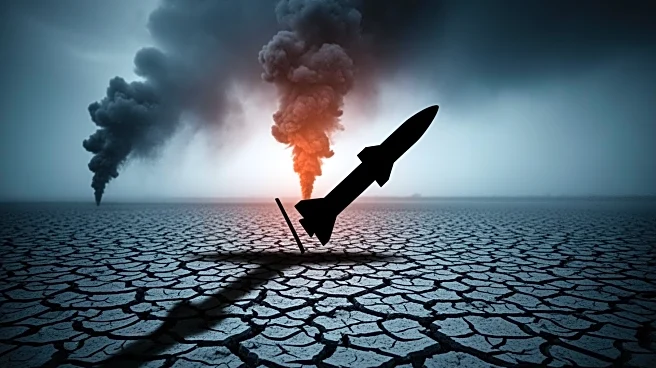What's Happening?
Russia has conducted tests on a new nuclear-capable, nuclear-powered cruise missile, known as the Burevestnik, which is designed to evade existing defense systems. President Vladimir Putin announced the successful test, which involved the missile covering
8,700 miles powered by nuclear energy. The Burevestnik, also referred to as 'storm petrel' in Russian, has been under development for years and is part of Russia's strategic nuclear messaging amidst ongoing tensions with Western nations over Ukraine. The missile's development has raised concerns due to its potential environmental hazards, reminiscent of similar projects abandoned during the Cold War.
Why It's Important?
The testing of the Burevestnik missile signifies Russia's continued advancement in nuclear weaponry, potentially altering global military dynamics. The missile's ability to evade defense systems could challenge existing security frameworks, prompting NATO and other Western allies to reassess their defense strategies. Additionally, the environmental risks associated with nuclear-powered missiles could lead to international debates on arms control and environmental safety. The development of such weapons may also influence geopolitical negotiations, particularly in the context of the ongoing conflict in Ukraine.
What's Next?
Russia plans to integrate the Burevestnik into its military arsenal, which may lead to increased tensions with NATO countries. The U.S. and its allies might respond by enhancing their missile defense systems or pursuing diplomatic measures to address the potential threat. Furthermore, the environmental implications of deploying nuclear-powered missiles could spark international discussions on arms control treaties and environmental protection protocols.
Beyond the Headlines
The development of the Burevestnik highlights the ethical and environmental challenges posed by nuclear-powered weaponry. The potential for accidents and radioactive contamination raises questions about the long-term sustainability of such military advancements. Additionally, the missile's deployment could influence global arms race dynamics, prompting other nations to pursue similar technologies, thereby escalating military tensions worldwide.
















